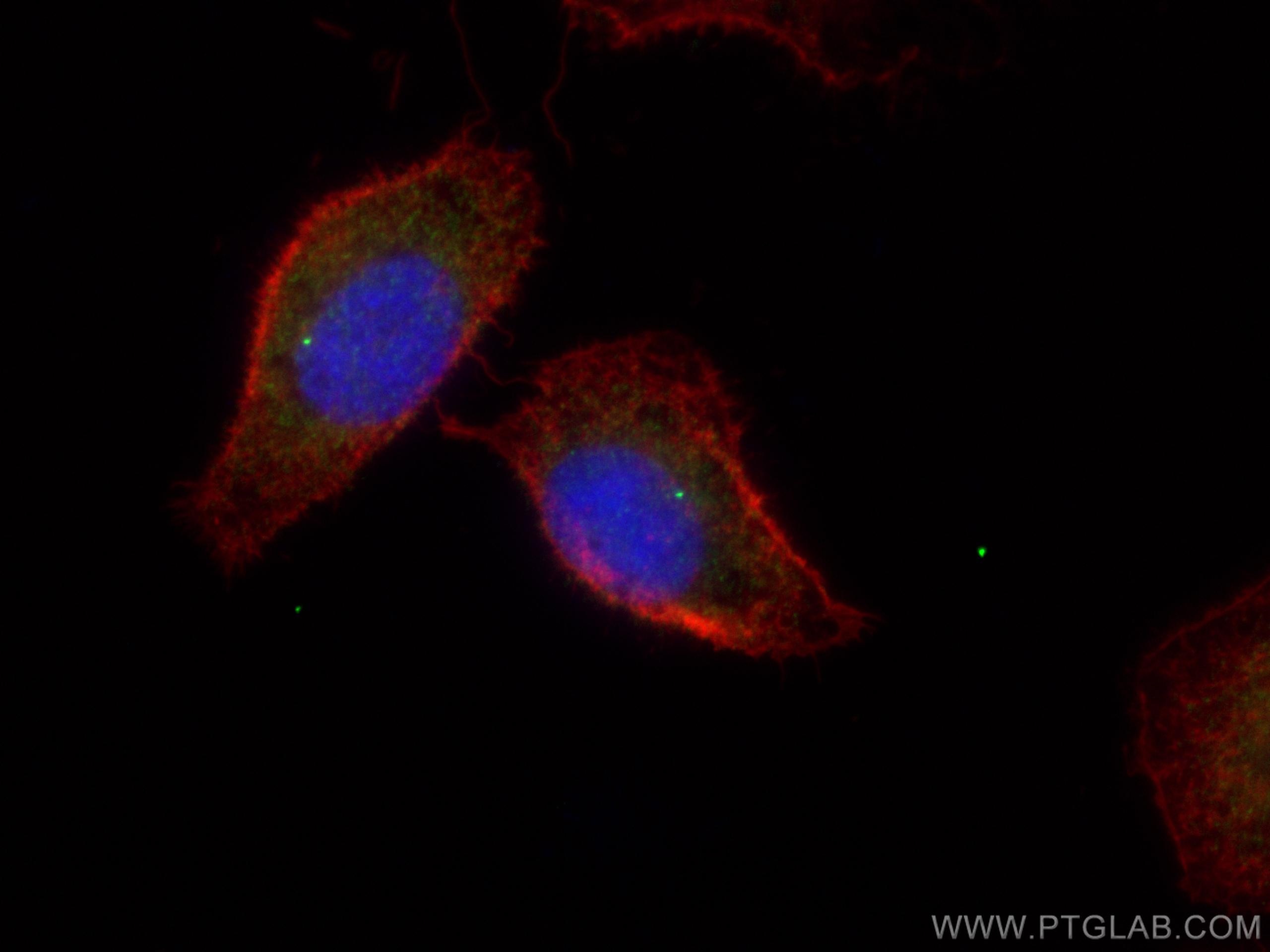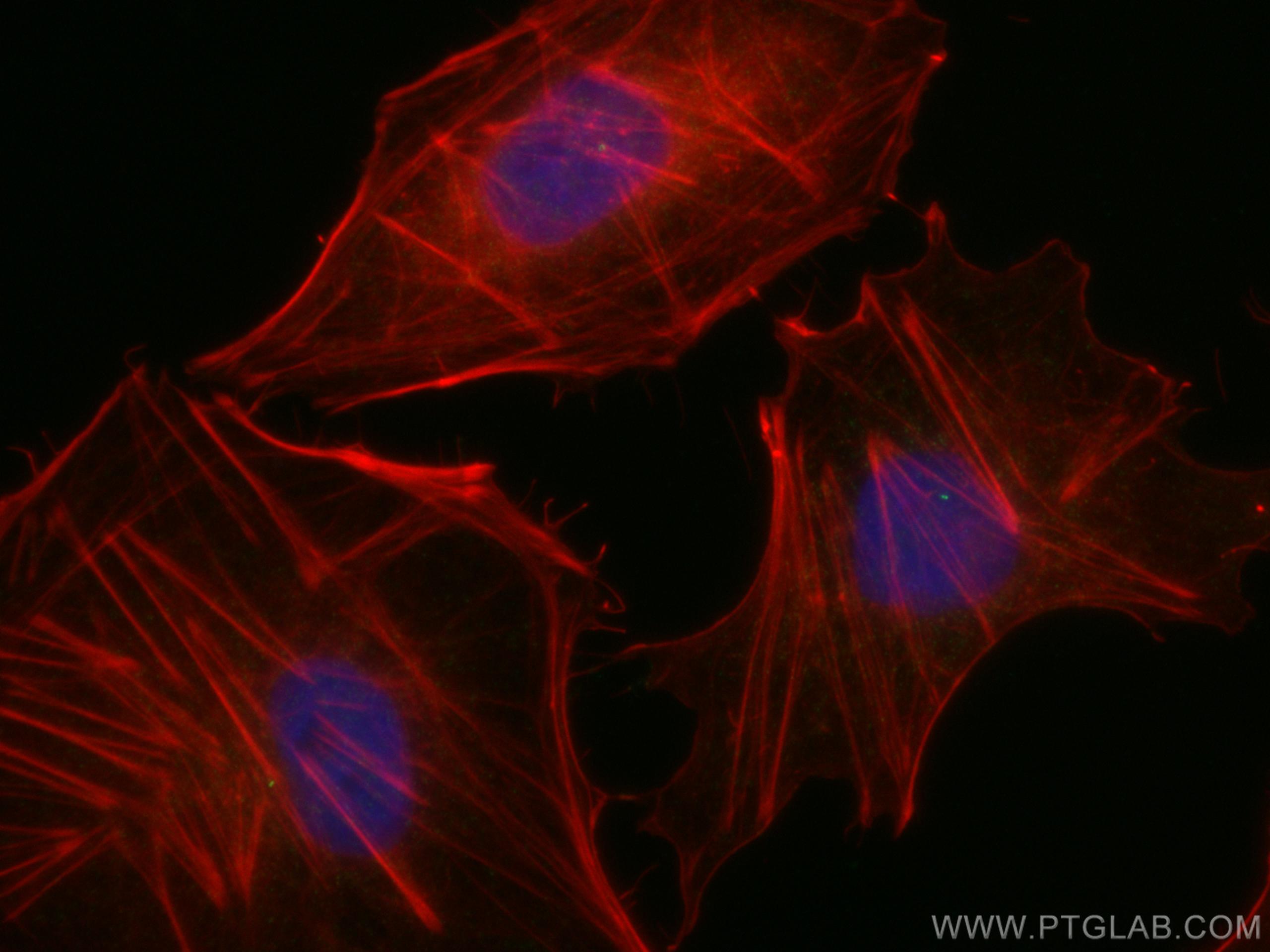Tested Applications
| Positive IF/ICC detected in | A549 cells, HUVEC cells |
Recommended dilution
| Application | Dilution |
|---|---|
| Immunofluorescence (IF)/ICC | IF/ICC : 1:200-1:800 |
| It is recommended that this reagent should be titrated in each testing system to obtain optimal results. | |
| Sample-dependent, Check data in validation data gallery. | |
Published Applications
| KD/KO | See 5 publications below |
| WB | See 12 publications below |
| IHC | See 1 publications below |
| IF | See 24 publications below |
| IP | See 1 publications below |
Product Information
11531-1-AP targets FBF1 in WB, IHC, IF/ICC, IP, ELISA applications and shows reactivity with human, mouse samples.
| Tested Reactivity | human, mouse |
| Cited Reactivity | human, mouse |
| Host / Isotype | Rabbit / IgG |
| Class | Polyclonal |
| Type | Antibody |
| Immunogen |
CatNo: Ag2106 Product name: Recombinant human FBF1 protein Source: e coli.-derived, PGEX-4T Tag: GST Domain: 20-347 aa of BC023549 Sequence: LASHTRDTTGVSQMFPSSKARTKSLLGDDVFSTMAGLEEADAEVSVISEADPQALLQAMKDLDGMDADILGLKKSNSAPSKKAAKDPGKGELPNHPKPAGGAIPTKKSLPSPSSSGHQNRRFSSEDLEDPLGGLLSYDEGGITKQPPVTQSKTASDKSPSTVRDQGPSIPLTPGDTPIRKKEELLFDDGDDIMATLGFGDSPKAEKRQIGDQEGPRPARSTLDELLGRGMATKLLARPGTGEHREFKLDKKYQRPQDSEDMWGDEDFTFGAYQPTVVSSEGRQSRRQSVSRFFADSGADPKGEPGSKQSPPMASSPIQPRKGGADWLG Predict reactive species |
| Full Name | Fas (TNFRSF6) binding factor 1 |
| Calculated Molecular Weight | 1133 aa, 125 kDa |
| Observed Molecular Weight | 130 kDa |
| GenBank Accession Number | BC023549 |
| Gene Symbol | FBF1 |
| Gene ID (NCBI) | 85302 |
| RRID | AB_2246683 |
| Conjugate | Unconjugated |
| Form | Liquid |
| Purification Method | Antigen affinity purification |
| UNIPROT ID | Q8TES7 |
| Storage Buffer | PBS with 0.02% sodium azide and 50% glycerol, pH 7.3. |
| Storage Conditions | Store at -20°C. Stable for one year after shipment. Aliquoting is unnecessary for -20oC storage. 20ul sizes contain 0.1% BSA. |
Background Information
FBF1, also named as ALB and KIAA1863, is keratin-binding protein required for epithelial cell polarization. It is involved in apical junction complex (AJC) assembly via its interaction with PARD3. FBF1 is required for ciliogenesis. FBF1 has six isoforms with MW 125-127 kDa, 99 kDa, 69 kDa and 55 kDa. This antibody is induced by N-terminal (20-347aa) of FBF1. It recognizes all the six isoforms.
Protocols
| Product Specific Protocols | |
|---|---|
| IF protocol for FBF1 antibody 11531-1-AP | Download protocol |
| Standard Protocols | |
|---|---|
| Click here to view our Standard Protocols |
Publications
| Species | Application | Title |
|---|---|---|
Nat Commun Transiently formed nucleus-to-cilium microtubule arrays mediate senescence initiation in a KIFC3-dependent manner | ||
Sci Adv Ciliopathy protein HYLS1 coordinates the biogenesis and signaling of primary cilia by activating the ciliary lipid kinase PIPKIγ. | ||
Nat Commun A distal centriolar protein network controls organelle maturation and asymmetry. | ||
Nat Commun Axoneme polyglutamylation regulated by Joubert syndrome protein ARL13B controls ciliary targeting of signaling molecules. | ||
Nat Commun TALPID3 and ANKRD26 selectively orchestrate FBF1 localization and cilia gating. |






